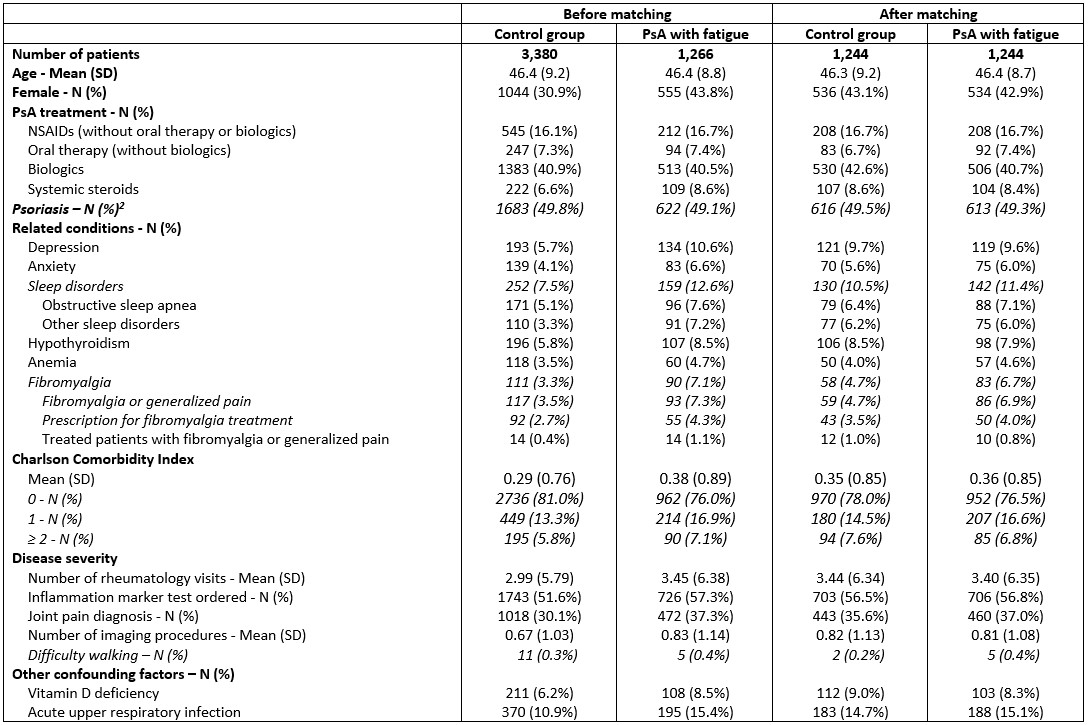Session Information
Date: Saturday, November 6, 2021
Title: Patient Outcomes, Preferences, & Attitudes Poster I: Impact (0225–0240)
Session Type: Poster Session A
Session Time: 8:30AM-10:30AM
Background/Purpose: Fatigue is a complex symptom affecting physiological, psychological, and social factors and is commonly seen in psoriatic arthritis (PsA). Fatigue has been shown to be associated with both short-term and long-term work absences. The objective of this study was to evaluate the impact of fatigue on short-term disability among patients with PsA in the United States.
Methods: Adults eligible for short-term disability benefits between 2009 and 2019 were screened in the IBM® MarketScan® Commercial and Health and Productivity Management Databases. Patients with ≥ 2 diagnoses for PsA ≥ 30 days apart were included. Patients with fatigue (i.e., cases) had ≥ 1 fatigue diagnosis after their initial PsA diagnosis, and the first fatigue diagnosis was defined as the index date. Controls were PsA patients who had no fatigue diagnoses during the study period; their index date was defined using the cases’ median time from initial PsA to the first fatigue diagnosis. Patients had continuous enrollment from ≥ 6 months before their initial PsA diagnosis (baseline period) to ≥ 12 months after the index date (follow-up period) and had to be eligible for short-term disability benefits during the entire follow-up period. Patients with rheumatoid arthritis, ankylosing spondylitis, Crohn’s disease, or ulcerative colitis during the study period were excluded from the analyses. Controls were matched 1:1 to cases based on propensity scores that balanced age, gender, year of initial PsA diagnosis, PsA treatment, related conditions, the Charlson Comorbidity Index, variables associated with PsA disease severity, vitamin D deficiency, and common infections (Table 1). Change in short-term disability and associated costs (in 2019 USD) were calculated from baseline through follow-up.
Results: 1,244 patients with fatigue were matched to the control group (Table 1). The average age at baseline was 46.3 years and 43.0% were female. Patients with PsA and fatigue missed an average of 6.9 days due to short-term disability, whereas controls missed an average of 3.4 days (p=0.0013, Table 2). Average costs associated with short-term disability were $438 and $897 for controls and PsA patients with fatigue, respectively (p=0.0011). During follow-up, 6.6% of patients in the control group had at least one short-term disability leave compared to 10.2% of patients with fatigue (p=0.0014).
Conclusion: Higher rates of annual short-term disability were observed among patients with PsA and fatigue than without fatigue. These results highlight the substantial indirect costs and economic burden of fatigue in patients with PsA.
(1) Variables were evaluated during the 6-month baseline period
(2) Variables in italic were not included in the matching
To cite this abstract in AMA style:
Husni E, Peterson S, Dennis N, Yang F, Lin I, Wang Y, Chakravarty S, Fischer C, Shawi M, Quenéchdu A, Merola J. Work Disability Associated with Fatigue in Patients with Psoriatic Arthritis – a Retrospective Study Using Claims Data, 2009-2019 [abstract]. Arthritis Rheumatol. 2021; 73 (suppl 9). https://acrabstracts.org/abstract/work-disability-associated-with-fatigue-in-patients-with-psoriatic-arthritis-a-retrospective-study-using-claims-data-2009-2019/. Accessed .« Back to ACR Convergence 2021
ACR Meeting Abstracts - https://acrabstracts.org/abstract/work-disability-associated-with-fatigue-in-patients-with-psoriatic-arthritis-a-retrospective-study-using-claims-data-2009-2019/


